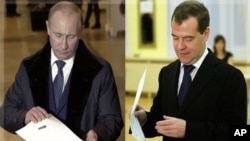Russia's Prime Minister is hoping for a renewed mandate from Sunday’s parliamentary elections. Instead, Vladimir Putin's political party appears to have lost ground.
Exit polls indicate that Mr. Putin’s United Russia party is hoping to keep its majority in parliament, with nearly one quarter of its seats going to the opposition.
After state-run television aired exit polls that indicated that fewer than half of Russian voters supported the ruling party, Mr. Putin and President Dmitry Medvedev addressed a meeting of party officials on live television.
Mr. Medvedev said the reduced support at the polls reflected the mood in the country.
Russians complain about corruption, a big gap between rich and poor, an authoritarian political system and a weak economy that only now is back to the level it was before the global economic recession three years ago.
With about half of the ballots counted, United Russia has won about half of the votes cast, down from 64 percent in the last parliamentary elections in 2007. That vote gave the ruling party a two thirds majority, enough to change the constitution.
Now it looks as if the United Russia will need to make alliances to pass simple legislation.
On national television Sunday night, Prime Minister Putin seemed unconcerned. Mr. Putin said the election results will allow for the stable development of Russia. But analysts say he had hoped for a political boost from Sunday’s vote. In three months, Mr. Putin is scheduled to face voters in presidential elections.
In Moscow, voting was strong for the opposition party, Just Russia.
At a downtown voting station, Alexander Pavlovich Archipov said he voted for Just Russia, hoping to keep the ruling party from controlling parliament. Archipov said he hoped a strong opposition could force a change in United Russia's plans to keep Mr. Putin in power through 2024.
After polls closed across Russia, the political opposition charged that the ruling party vote was boosted by fraud and strict media controls.
The Communist Party complained that the elections were undermined by “massive fraud." Exit polls appear to show the communists coming in second.
Anonymous attacks on the Internet on Sunday knocked out independent media websites and the website of Golos, or Voice, the only independent election observer group in the country.
Alexei Venediktov, editor in chief of Moscow Echo, a popular radio station downed by the Internet hackers, wrote on Twitter: “The attack on the website on election day is clearly an attempt to inhibit publication of information about violations.”
A week before the election, Mr. Putin compared Golos to Judas, a traitor in the Christian Bible. A judge has fined Golos $1,000 for its activities. And a state television network attacked it in a 30-minute program on Friday. Customs police also detained Golos director, Lilia Shibanova, and confiscated her computer.
Nonetheless, Shibanova says that 90 percent of the group’s 2,500 observers were allowed to watch the voting. Shibanova says that in addition to pressure on poll watchers, many absentee ballots were fraudulently used. Golos says that the vast majority of more than 6,000 election complaints that have been lodged are about the conduct of the United Russia party.
Using cell phone cameras, voters say they have documented “cruise voting”, groups of people being bused from polling station to polling station to fill out absentee ballots. Others say they filmed hospital directors, university professors and factory owners pressuring nurses, students and workers to vote for the ruling party. Some poll watchers complained that they were not allowed to check to see whether ballot boxes were empty at the start of the day.
After voting in Moscow, Marina Takhirovna, said she believes that the amount of fraud and ballot stuffing was worse than in 2007.
She says she voted largely to ensure that the ruling party did not use her unmarked ballot.




